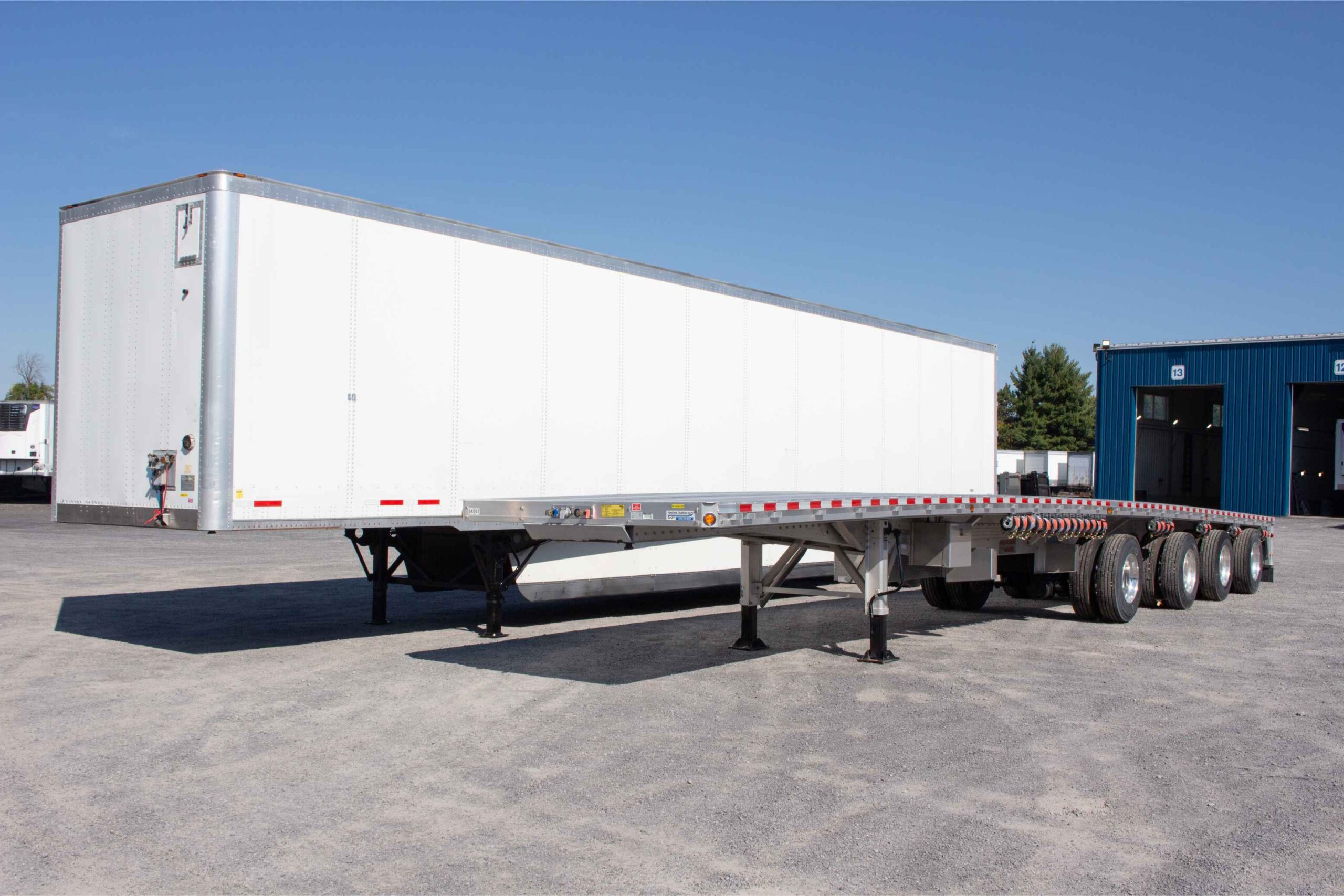Your transportation company has landed a promising new contract. One question immediately comes to mind: do you need a trailer, and what is the right equipment for the job? Choosing a trailer may seem simple, but opting for the wrong type can be costly in terms of time, efficiency, and safety. At the heart of this strategic decision are the two main types of trailers in the industry: the dry van, a versatile fortress, and the flatbed, a champion of flexibility.
This isn’t simply a matter of preference; it’s a strategic decision that directly impacts your growth and profitability. This comparison guide will help you analyze your needs to choose the trailer that will work most effectively for you.
The Dry Van: The Industry Standard
The dry van is the most common model on our roads, and for good reason. It is a fully enclosed rectangular box that protects cargo from the elements, road debris, and theft.
- Ideal Uses: This is the standard for general transportation. Think pallets of dry goods, boxes, consumer products, electronics, or clothing. Essentially, anything that needs to arrive at its destination clean, dry, and safe.
- Key advantages:
- Maximum protection: This is its greatest asset. Your cargo is protected from rain, snow, and sun, while being secured by lockable doors.
- Ease of operation: Designed for standard loading docks, it allows for quick and efficient loading and unloading operations with a simple pallet jack.
- Versatility: It can accommodate a huge variety of goods, making it easy to maximize profitability by avoiding empty trips.
- Disadvantages:
- Size limitations: Its very structure imposes strict height and width constraints.
- Dependence on docks: Loading and unloading are much less efficient without a suitable loading dock.
Flatbed: Freedom without constraints
The flatbed is the exact opposite: an open, sturdy floor with no walls or roof. Its minimalist design is its greatest strength, offering almost unlimited flexibility.
- Ideal uses: It is indispensable for oversized or irregularly shaped loads. It is the king of transporting construction materials such as wood or steel, as well as heavy machinery or agricultural equipment.
- Key advantages:
- Unmatched flexibility: You can load items that would never fit in a closed trailer. The only limit is road regulations.
- Multi-directional loading: Goods can be loaded from the sides, from the rear, or directly from above using a crane, which is impossible with a closed trailer.
- Adaptability: Perfect for deliveries to construction sites or locations without loading docks.
- Disadvantages:
- Exposure to the elements: The cargo has no protection from the weather. The use of tarpaulins is often necessary, which requires considerable physical labor and time.
- Complexity of securing the load: Securing the load is a science in itself. It requires considerable expertise, specialized equipment (straps, chains), and directly engages the carrier’s responsibility in the event of a problem.
- Vulnerability to theft: Goods are exposed and therefore more susceptible to theft if left unattended.
Face-to-face: How to make your choice?
To make the right decision, ask yourself the following questions:
- What is the nature of my goods? If you mainly transport goods on pallets that require protection, a closed trailer is the logical choice. If your loads are bulky, heavy, or irregularly shaped, a flatbed trailer is a must.
- Where are my loading/unloading points? If you mainly operate between warehouses with loading docks, a closed trailer is more efficient. For deliveries to construction sites, a flatbed trailer offers more flexibility.
Am I equipped to handle load securing? Flatbed transport requires training and meticulous attention to load securing. If this is not your specialty, the simplicity of a closed trailer reduces operational risks.
Conclusion: The right tool for the right job
There is no such thing as the “best” trailer, only the trailer that best suits your needs to adequately fulfill your contracts. Enclosed trailers offer security and simplicity for general transport, while flatbed trailers offer the freedom needed for specialized loads.
Choosing the right equipment is crucial to your profitability. At Gamache Truck Center, our experts don’t just sell you a trailer; they ask you the right questions to identify your needs and ensure you leave with the best asset for your business.
Still not sure? Talk to one of our advisors. Or browse our inventory of used enclosed trailers and flatbeds to find your next ally on the road!







